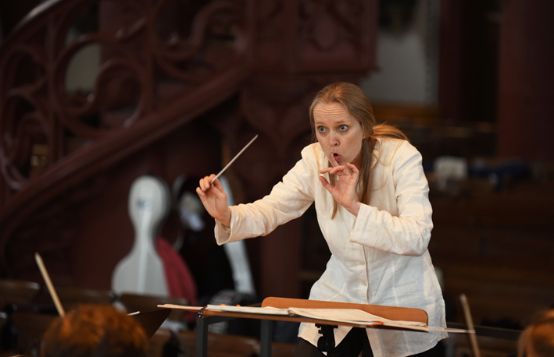Hindered and encouraged
The "frauenkomponiert" festival presents well-known and yet-to-be-discovered female composers.

On Women's Day in 2015, a dedicated group of people led by conductor Jessica Horsley organized a concert in Basel's Stadt-Casino. The program included Fanny Hensel's Hero and Leander: Dramatic scene for one voice with orchestral accompaniment (1832) and Sofia Gubaidulina's Impromptu for flute, violin and string orchestra (1996). As a conductor, Jessica Horsley had asked herself why the music of female composers was still rarely performed and had set herself the task of addressing this shortcoming. Her efforts quickly fell on receptive ears. A year later, she performed a program of symphonic works by Emilie Mayer (1812-1883), Junghae Lee (*1964), Ethel Smith (1858-1944) and Vítĕzslava Kaprálová (1915-1940) with the festival orchestra L'anima giusta. The whole event was complemented by a panel discussion with experts.
After a two-year break, the organizers are now back with a five-day festival (7 to 11 March) with fifteen concerts in Basel, Zurich and Bern. A long list of sponsors testifies to the great interest in this topic.
Symphonic works have a particularly hard time
Orchestral works composed by women are the focus of the festival because, as Jessica Horsley explains, they have found it particularly difficult to be heard in the last 250 years. The major symphony concert was played in all three cities over the festival weekend, giving four remarkable female composers a well-deserved platform.
The name Agnes Tyrrell (1846-1883), a Czech composer and pianist of English origin, is enough to make you rub your eyes in amazement. Even more so when you read that she was one of the most important female composers in Europe, yet most of her major works were still awaiting their premiere. According to the program booklet, Tyrrell was "one of the few women to write a symphony before 1900" and thus break into a male domain. Thanks to a sheet music edition commissioned by the frauenkomponiert association, the overture to her oratorio The kings of Israel will be premiered.
The life of the American Amy Beach (1867-1944) can also be read as a story of being hindered. Despite her great musical talent, she is said to have been discouraged by her parents and later by her husband from pursuing a career as a musician. Beach composed the great, late Romantic Symphony in E minor op. 32 Gaelic (1896) can be heard. Beach was inspired by Irish folk songs and conceived the work, as Christine Fischer writes in the program booklet, "as a direct response to Antonín Dvořák's From the New World".
Women composers of our time have it somewhat easier. They are no longer actively prevented from practicing their profession. In the case of Heidi Baader-Nobs (*1940), whose piece Evasion (2017) was premiered, but taking care of her three children has meant that she has taken longer breaks from composing. The virtuoso child, twelve-year-old violinist, pianist and composer Alma Deutscher (*2005) from England, certainly cannot complain about a lack of interest from the public. Together with the festival orchestra under the direction of Jessica Horsley, she was able to perform her self-composed Violin Concerto No. 1 from 2014 as the Swiss premiere.
Chamber music from wistful to humorous
Two of the chamber music concerts stand out. Three famous female baroque composers were presented in the Ackermannshof in a program worth listening to, accompanied by video projections. The Musica Fiorita ensemble under the direction of harpsichordist Daniela Dolci exuded Baroque splendor in pieces by Barbara Strozzi (1619-1677), probably the best-known of the three composers, Elisabeth Jacquet de la Guerre (1665-1729) and Antonia Padoani Bembo (1640-1720). They were considered admired talents and strong, independent women in their time. The soprano Sara Bino sang two pieces by Barbara Strozzi as well as an aria from the opera L'ercole amante by Padoani Bembo. Germán Echevveri interpreted the solo part of the Sonata in D minor for violin and basso continuo by Jacquet de la Guerre without frills and with a rounded tone. The artistic videos by the Basel Institute of Art and Design, presented on three screens, provided an enriching visual counterpoint.
On Saturday, soprano Maja Boog and her piano accompanist Simon Bucher took the audience on an enchanting journey between romance and jest. The five devotedly performed songs by Alma Mahler (1879-1964) made one regret that only seventeen of the approximately 100 songs that Alma Mahler composed have survived. The singer achieved a wistful depth with the Six Songs op. 13 by Clara Schumann (1819-1896). I stood in dark dreams (Heine) was particularly gripping in its harrowing simplicity. They were complemented by four impressionistic songs by Swiss composer Caroline Charrière (*1960). The humorous finale was provided by fables set to music by Isabelle Aboulker (*1938).








